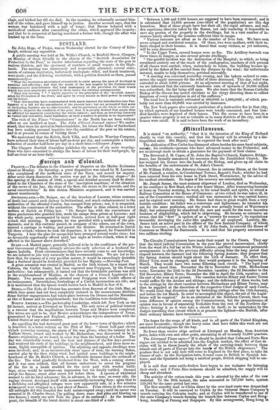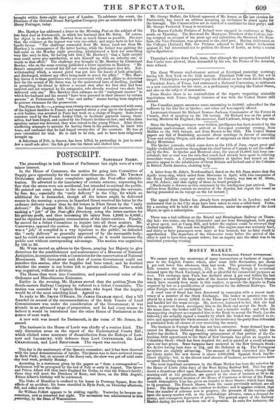atilistellantous.
It is stated "on authority," "that it is the intention of the King of Holland shortly to visit this country, and that his Majesty will be attended by a dis- tinguished suite. His Majesty may be expected the week after next."
The abdication of Don Carlos has dismayed others besides his mere loyal subjecta, namely, his creditors—persons who have advanced money to the Pretender, and. see no attempt made to obtain a guarantee for the payment of their claims.
The Reverend J. M. Capes, of St. John the Baptist's Church, Eastover, Bridge- water, has formally announced his secession from the Established Church. He- has resigned his licence into the hands of the Bishop, and given up all claim to the benefits of the endowments of St. John's Church.
Sir William Follett, the Attorney-General, lies in extreme illness, at the house of Mr. Pennell, a relative, in Cumberland Terrace, Regent's Park; whither he had been removed from his own house in Park Street, Westminster, by the advice of his medical attendants. No hopes of his recovery are entertained.
Mr. Joseph Somes, the most eminent shipowner of London, died on Wednesday, at his residence in Bow Road, after a few hears' illness. After transacting business- at home on Tuesday morning, he went, in his usual health and spirits, to attend Railway. Committee at the House of Commons: at two o'clock he was taken ill, in one of the Committee-rooms; medical aid was summoned; he was carried home; and he expired next morning. Mr. Somes had risen to great wealth from a very humble condition: his father was a waterman and lighterman; he intended his son for the same profession, and the youth was actually bound at Watermen's- Hall ; but subsequently he abandoned the oars and sculls for the more lucrative business of shipbuilding, which led to ship] owning. He became so extensive an owner, that his " fleet " is spoken of as a 'nursery for seamen"; its regulations favourably developing the sailor-like qualities of all employed. Latterly, Mr.:.
Somes took an active in the affairs of the New Zealand Company, of which. he was Governor; an on the death of Sir John Seale, he entered the House or Commons as Member for Dartmouth. It is said that his property amounted to two millions sterling.
The Circuits Commissioners have made their report to the Crown. They say that the third judicial Commission in the year has proved inconvenient, chiefly- from the want of a full bar at the Winter Assizes; and they recommend permanent arrangements to obviate the previous difficulty arising from the long period that elapsed between the Summer and the following Spring Assizes: they propose that the Spring Assizes should begin about the 11th of January. To effect that Hilary Term must be changed; and they would postpone it to the beginning of March. They would have two terms following each circuit. " The legal year would then stand thus. November the 2d to November the 25th, Michaelmas term; November the 25th to the 2d December, vacation; the 2d December to the 23d December, Hilary Term; December the 23d to April the 15th, vacation; and the rest of the year as at present. The vacation betwen Hilary and Easter Terms would suffice for the Assizes and sittings; and the deficiency of three weeks, lost. to the sittings by the short vacation between Michaelmas and Hilary Terms, may then be supplied at the discretion of the respective Chief Judges of each Court.- We would limit that discretion only by forbidding sittings after the 11th January, and before the 1st March. In order to accomplish this object, the aid of the Legis- lature will be required." As to an alteration of the Northern Circuit, there was some difference of opinion among the Commissioners, but the preponderance of opinion was in favour of separating Yorkshire from the rest of the Northern dis- tricts; forming it as it were into a circuit by itself; to be undertaken by the Judges travelling that circuit which is at present the lightest—the Norfolk, after their ordinary labours have terminated.
The hopes for the crops, of all kinds, and in all parts of the United Kingdom, are most favourable; though the heavy rains that have fallen this week are not considered advantageous for the hay.
No fewer than twelve ships arrived at Liverpool on Monday, from Austrian ports, laden with corn and other grain, amounting in all to nearly 15,000 quarters.
The Liverpool Times says—"If it should be decided that Cuba and Porto Rico sugars are entitled to be admitted into the English market, the effect of that de • cision will be to throw !nearly. the whole of the carrying-trade between those. islands and all parts of Europe into the hands of the British shipowners." The produce that is not sold here will come to England in the first place, to take its chance of sale: by the Navigation-laws, it must come in British or Spanish bot- toms; and the Spaniards not being a nautical people, British shipping will be em- ployed.
It is said that some cattle-feeders have begun to use molasses for fattening their stock; and if Porto Rico molasses should be admitted, the supply will be cheap and abundant.
The activity of the cotton-trade this year is attested by the sales of the raw materiaL To the 20th instant, the sales amounted to 737,640 bales, against. 559,281 for the same period last year. The first monthly mail to China direct by the over-land route was despatched on Tuesday. It will be conveyed to Ceylon by the Oriental Steam Company's. vessels carrying the Calcutta mails; and at Ceylon will be transferred to one of the same Company's vessels forming the branch-line between Ceylon and Hong- kong, touching at Penang and Singapore. By this arrangement, Hong-kong is brought within forty-eight days post of London. To celebrate the event, the Directors of the Oriental Steam Navigation Company give an entertainment to Sir Henry Pottinger, today.
Mrs. Hawkey has addressed a letter to the Morning Post on the subject of the ]ate fatal duel at Portsmouth, in which her husband shot Mr. Seton. Of course, her object is to absolve Mr. Hawkey from as much blame as possible. She says that the evidence at the inquest was very one-sided; and urges facts in her hus- band's favour. "The challenge emanated from Mr. Seton, (and not from Mr. Hawkey,) in consequence of the latter having, while the former was quitting the ball-room on the Monday night preceding, administered a kick (or something very like one) to him, for having told him ( Mr. Hawkey) ' that a light cavalry man could never give satisfaction, or mix himself up with an infantry one; or words to that effect." The challenge was brought to Mr. Hawkey by Lieutenant Bowles; who on the same evening published a letter injurious to Hawkey. "Mr. Seton's antagonist received but did not return that gentleman's first fire. Not- withstanding which, a second pistol was put into the hands of both and discharged, without any effort being made to arrest the affair." "Mrs Haw- key leaves it to those gentlemen who are conversant with such affairs to determine how far the second of Mr. Seton was, by the understood laws of duelling, justified in permitting his friend to deliver a second shot after his first shot had been received and not returned by his antagonist, who thereby received two shots but delivered only one." Mrs. Hawkey then enlarges on the "malignant manner" in which her husband and his second "have been pursued in their absence by certain persons " at Portsmouth; both " due and undue " means having been employed to procure witnesses for the prosecution.
The Prince De B—, a young man twenty-two years of age, connected with some of the highest families in France, and married about a year ago to the daughter of a rich banker, was arrested in Paris last week on a charge of forgery. Some ivory counters used by the French Jockey Club, to facilitate payment among them- selves, had been forged, and cashed by the Prince's brother-in-law; and when their _spurious nature was detected, they were traced to the young Prince. After divers conflicting attempts to account for having them in his possession, he burst into tears, and confessed that he had forged twenty-five of the counters. He was at once committed for trial. He is said to be rich, and to have been religiously brought up.
A fisherman of Pelt, in Sasses, has been killed, by pretending in jest to swal- low a small sole alive: the fish got into his throat and choked him.



























 Previous page
Previous page